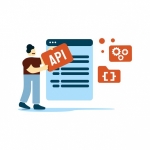In today's tech-driven world, application programming interfaces, or APIs, have become vital tools for developers, powering everything from mobile apps to complex data systems. Choosing the best API for developers can save time, reduce costs, and significantly improve functionality. But with so many options available, how can developers pick the right one? Here, we'll break down the importance of choosing the right API and highlight what makes an API for developers stand out.
Understanding the Basics: What is an API?
An API allows different software programs to communicate with each other. They work as a bridge, enabling applications to interact without knowing the internal workings of each other's code. APIs can range from simple data-sharing tools to complex, real-time data processing services, and they have applications across every industry. With businesses relying on automation, cloud computing, and mobile integration, having the best API for developers is essential.
Why Choosing the Right API is Essential
Not all APIs are created equal. Some are specifically designed for certain types of applications, like data processing, e-commerce, or social media integration. Using an API that doesn't fit your project needs can lead to technical challenges and cost you more time and money. Here are some reasons why picking the right API for developers is essential:
-
Efficiency: The right API can streamline processes, saving you time. A well-designed API integrates smoothly into your workflow, enabling faster development.
-
Scalability: If you expect your application to grow, a scalable API is a must. The best API for developers will support increased usage and handle higher demands without sacrificing performance.
-
Cost Savings: Many APIs come with costs, whether for the service itself or in terms of the time required to adapt the code. The right API minimizes these costs, offering a balance between functionality and affordability.
-
Security: With cybersecurity threats on the rise, using a reliable API with strong security protocols is essential. The best API for developers incorporates robust security measures, protecting your data and your users.
-
Support and Documentation: Even seasoned developers benefit from clear, comprehensive documentation. The best APIs come with extensive support and guides, ensuring you can troubleshoot issues and avoid costly mistakes.
Key Features of the Best APIs for Developers
Choosing the best API for developers comes down to understanding your project requirements and how well an API meets them. Here are some features to look for:
-
Ease of Integration: An API that's easy to integrate into your existing software is a time-saver. Look for APIs with clear, well-documented instructions, ideally with code snippets and examples.
-
Comprehensive Documentation: Detailed documentation can make or break an API. The best APIs provide tutorials, examples, and troubleshooting guides to simplify the learning curve.
-
Scalability: Whether you're building a small app or an enterprise-level solution, a scalable API is crucial. The best API for developers can handle increased data and traffic loads without significant performance drops.
-
Data Privacy and Security: For applications handling sensitive information, security is critical. Look for APIs with solid security features, including encryption and secure authentication protocols.
-
Regular Updates and Support: A good API should have regular updates and a responsive support team. API providers that regularly update their tools ensure compatibility with the latest tech trends and standards.
Types of APIs to Consider
There are several categories of APIs, and the best one depends on your project's needs. Here are some popular types:
-
REST APIs: Known for their simplicity, REST APIs are commonly used in web applications. They're scalable, easy to cache, and widely supported.
-
GraphQL APIs: For applications requiring specific data structures, GraphQL APIs offer flexible, efficient queries. Developers can request only the data they need, reducing over-fetching.
-
SOAP APIs: Although older, SOAP APIs are still widely used for enterprise-level applications, especially those requiring high security.
-
Open APIs: Also called external or public APIs, these are open to developers and other users with minimal restrictions, making them great for broad applications.
-
Internal APIs: Used within a specific organization, internal APIs help streamline processes and improve integration within different internal applications.
-
Composite APIs: These allow developers to make multiple API calls in one request, improving efficiency for applications that require data from several sources.
How to Identify the Best API for Developers
Here are some steps to determine which API for developers is the best for your project:
-
Define Your Requirements: Knowing your application's requirements—whether it's handling data, processing transactions, or managing users—is the first step to finding the right API.
-
Evaluate Performance: Look for APIs with high uptime, low latency, and reliable performance. Test an API with a few sample calls to see how it performs under typical conditions.
-
Check for Compatibility: Ensure the API integrates smoothly with your existing software. Incompatible APIs can slow development and lead to unexpected bugs.
-
Security Standards: Look for APIs that comply with security standards like OAuth, SSL, and encryption. This is especially important for applications dealing with sensitive data.
-
User Reviews and Community Feedback: Feedback from other developers can provide valuable insights. Check forums, developer communities, and review sites to see what others say about the API.
Examples of Popular APIs for Developers
To help you get started, here are a few widely regarded APIs used across various industries:
-
Google Maps API: Ideal for location-based apps, it offers mapping, geolocation, and routing services.
-
Stripe API: A popular choice for payment processing, Stripe API allows for secure transactions with minimal setup.
-
Twilio API: Known for its communication features, Twilio is excellent for applications needing SMS, voice, or video integrations.
-
Firebase API: Google's Firebase offers a suite of tools for mobile and web applications, including real-time databases, authentication, and analytics.
-
SendGrid API: Perfect for applications requiring email functionality, SendGrid allows for easy email campaign management and transactional emails.
-
OpenWeatherMap API: For weather-based applications, OpenWeatherMap provides real-time and forecast data with detailed analytics.
Final Thoughts: Choosing the Best API for Developers
Selecting the right API for developers can mean the difference between a smooth development process and one fraught with complications. From performance to security, understanding your project's needs and evaluating potential APIs against those needs will help you make the best choice. With the right API, developers can build faster, more efficient, and secure applications, delivering a better experience for users.
Finding the best API for developers ultimately comes down to research and careful consideration. By taking the time to evaluate your options, you'll set yourself up for success in delivering a powerful and reliable application.






